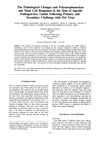Search
forLearn
5 / 6 resultslearn Osteopontin
signaling protein that, when suppressed, may grow hair by reducing inflammation and stem cell loss
learn Beta Polypeptide
learn Overview
learn Hair Multiplication
extract, clone, and reinsert your own hair cells
Research
5 / 1000+ results
research The Pathological Changes and Polymorphonuclear and Mast Cell Responses in the Skin of Specific Pathogen-Free Lambs Following Primary and Secondary Challenge with Orf Virus
Lambs' skin showed similar but more severe responses to a second orf virus infection, involving immune cells and new skin formation.

research Expression and Function of Keratinocyte Growth Factor and Activin in Skin Morphogenesis and Cutaneous Wound Repair
KGF and activin are crucial for skin healing and repair.

research Fibroblast Growth Factors: Key Players in Regeneration and Tissue Repair
Fibroblast Growth Factors (FGFs) are important for tissue repair and regeneration, influencing cell behavior and other factors involved in healing, and are crucial in processes like wound healing, bone repair, and hair growth.
research Cellular and Molecular Mechanisms of Repair in Acute and Chronic Wound Healing
Acute wounds heal well, but chronic wounds struggle due to ongoing inflammation and poor tissue repair.

research Integrated-Omics Profiling Unveils the Disparities of Host Defense to ECM Scaffolds During Wound Healing in Aged Individuals
Aged individuals heal wounds less effectively due to specific immune cell issues.
Community Join
5 / 37 results
community Compressed part of research of theory of androgenic/anabolitic balance. AGA h-responders analytic. Theory of physio-metabolitic method of anti AGA treatment
The treatment for androgenetic alopecia involves using finasteride and minoxidil with intense exercise and cold exposure to boost metabolism and reduce androgenic effects, potentially leading to hair regrowth. This approach may activate biological pathways for improved hair and overall health.
community A meta analysis of 18 popular hair loss treatments. An 2022 guide on efficacy. From finasteride and minoxidil to caffeine shampoo, saw palmetto and biotin. 96 Scientific References included.
Most hair loss treatments are ineffective; only finasteride, dutasteride, and minoxidil show effectiveness.
community Got my Oleic fatty acid they used in Korean study. Fuck you mice!
Oleic acid and microneedling are being explored for hair regrowth, but results are mixed. Addressing DHT and fibrosis is crucial, with treatments like finasteride, minoxidil, and scalp massage also discussed.
community Adipocyte lipolysis activates epithelial stem cells for hair regeneration through fatty acid metabolic signaling
Fatty acid metabolic signaling can activate epithelial stem cells for hair regeneration. Oleic and palmitoleic acids showed the best results, but practical application on humans remains uncertain.
community Molecular mechanisms triggered by Micronedlling -- Intersting Publication to better understand Dermarolling
This post and conversation are about the molecular mechanisms triggered by microneedling, specifically its effects on inflammation, tissue remodeling, epithelial proliferation, differentiation, and collagen synthesis. The discussion highlights the potential benefits of microneedling for hair loss treatment.